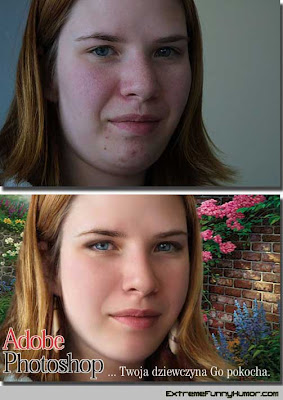
I almost called this, "Why I Hate Photoshop," but you can't hate something that can accomplish miraculous transformations like the one above. Maybe it's more accurate to say that I hate learning Photoshop from books, which is what I've been attempting to do.
What I hate about these books is how it's possible to follow the directions and still not get the same result as the author. When it doesn't work, you have to be Sherlock Holmes to figure out what's wrong. I hate having to do that constantly. Sometimes the answer's buried in some other chapter that dealt with photographers' issues, and which I thought an artist like myself could skip. Very frustrating. Artists need their own book.

The most striking thing about these books is that the authors never thought to stick ordinary readers of the books in front of the program to see what problems they have. Of course that would be a big undertaking. Photoshop is a big, lumbering behemoth (above) of a program, and reader-testing every part of it could be a chore. Even so, somebody should attempt it, at least for the chapters dealing with the fundamentals.
It's that big, lumbering thing that I want to talk about here. I almost feel sorry for Adobe because every new idea they come up with has to be built mostly on existing architecture. That lumbering architecture is what they own, what they have unassailable patents for. If some third party comes up with something new, say an intuitive, drag and drop version of the same thing, then Photoshop is sunk.

Their answer to third party challenges has been to keep adding functionality to the hippopotamus that they already own, but how long can they continue to do that? What happens when their manuals are 2,000 pages long? Some simplifying revolution is bound to happen.
[NOTE: I don't wish the program was dumbed down, I just wish that it would do what it already does in a simpler, more intuitive fashion. That way I could learn the basics from a book and get on with my life.]
It's interesting to imagine what would happen if Photoshop decided to build a new architecture based on more current ideas. A lot of the new ideas are open source or have legally uncertain paternity. It would be hard to build something really big and exclusive on a mess like that.
It's interesting to see how many current non-Adobe programs also use layers and filters and all that. I wouldn't be surprised if Blogger offered some much simplified, open source version of some of that for free to its users. My favorite non-Adobe Photoshop-type program is Pixelmator, which is a sort of reduced Photoshop for mac users. It does some of what Photoshop does, but it appears to be easier to use and costs a tenth of the price. I say "appears" because I haven't tried it yet.
Here's (above) a nine minute video showing how a composite is done on Pixelmator. Compare it to how the same thing would be done on Photoshop. Pixelmator is so cheap that I assume it's based on open source. It shows how far open source has come in legally approximating what Photoshop does. It's only a matter of time before this OS method is merged with iPad-type drag and drop simplicity.

14 comments:
actually, that method of compositing seemed virtually identical to how you'd do it in photoshop, with the exception of the click-and-drag function of the magic bacground eraser too he used to eliminate godzilla's beige background...
Photoshop isn't for necessarily for hobbyists, it's just something that many people have latched onto. It has deep features because it's a professional program, and a lot of things to a lot of people.
When developers create "push button" versions of software, like Photoshop elements, iPhoto, etc, it's for users that either don't care for the deep features, will never use them, or don't want to learn about them. Developers are basically limiting users freedom to do things when they do this. Photoshop is complex because the need for it is complex, and it will likely become more complex as the need for digital art increases in the future.
In my mind, saying Photoshop is too complex is like saying Paint Chemistry is too complex. Many painters are skilled enough to take advantage of high levels of painterly skill. But to answer more basic painters need for simpler products by simplifying tools meant for the masters is not a terribly good idea.
Hopefully this doesn't sound too pretentious. I don't mean it to be.
You're right, though, Photoshop will likely not be the king of photo manipulation forever, at least at the level of the ordinary user, simply because many people seek computers that are more like appliances than the more open platforms the high-end users need. You push a button, you get toast. You push another button, and you fix your wedding photos. This is what people want because they don't have the time to learn a program as complex as Photoshop to take the red eye off of pictures of their dog.
There are, of course, programs available with lots of Photoshop style features. The most famous is likely the open source GIMP program, which I've used but don't really like. I could probably learn the program just as well as I know Photoshop, but after several years of professional use, PS is a lot less like a hippopotamus and more like an old comfy chair.
Hey, Eddie, this is unrelated, but check out this youtube video! This is one of the best sports mascost costume I've ever seen!
http://www.youtube.com/watch?v=_cY8aWUBCLw&feature=player_embedded
One thing I'd like to see in photoshop and other massive programs is a reduced palette of options. Going into that program totally green is difficult because of the sheer amount of options available in the interface.
So if you want to say composite images you'll get only the necessary features to do that and all the others are out of sight and out of mind. As your skill progresses and you start bumping into limitations you can increase the set of features but at that point you'll see the new features as a blessing and not a distraction.
This isn't a totally new idea here, but it's a much smarter way of doing things than the old look it up in the manual way of doing things.
It would be nice if articial intelligence advanced to the point where computers got the gist of what you are trying to do and can fill in a lot of the work for you. Most people who use photoshop and adobe products professionally tend to do the same few tasks over and over again so it would be nice if software could learn your routines, like how a girl at coffeshop you frequent will go let me guess "medium double double and a boston cream donut?"
Be nice if you could run photoshop in simplified modes with only options for whatever tasks you're trying to do
What are your thoughts on Thomas Kincade?
EZG: Thanks for the interesting comment! I probably didn't say it properly, but my complaint about Photoshop is not that it has too many features, but that it's unintuitive, and unnecessarily complicated.
I don't want to see the program dumbed down. I just want it to do what it already does in a simpler way.
i got very lucky, a friend already had photoshop and was very enthusiastic about it, he definately wanted to share all he had learned about it, so i took advantage and learned from him, if youre an artist you should always do the do it yourself trial and error route-book learning aint for us-i think the artist brain is just wired differently.
Using Photoshop confuses me alot.
I don't understand it.
I find Photoshop simple to use, but then I've been using it for a few years. I can't even begin to imagine what it would be like to go into it knowing little or nothing about it.
Now that I think about it, it probably could do with being a lot more intuitive. There's lots of windows, lots of lists and menus, and everything is equally as noticable and so everything starts to look the same and remembering where a specific feature or option is becomes really difficult.
dear uncle eddie,
love your theories, they are always a great thing to read because there is something new and insightful all the time.
I find photoshop probably the best program out there, and wouldn't recommend anything else, sure other ones might get close to what photoshop can accomplish, but they never do anything as good, but that's just my opinion.
If you are having trouble with the basics, then I will be more than happy to help you out with anything you want to know personally (I too had similar problems with the learning curve). Just let me know if you are keen, I think I am a pretty good teacher, but again, that's just my opinion.
cheers to you and your musings
-LFW
Jorge: Haw! That was hilarious!
Adam, Steini: Interesting!
Anon: I don't know what I think of Kinkade. I like his pastoral, English cottage-type utopian vision, and I like things that are funny because they're so over the top, but i can't imagine putting anything that sentimental on my wall.
LFW: Wow! Many, many thanks for the offer. I'll remember that you said that!
Jerk: Thanks! I modified the text a little to accomodate what you said.
Admittedly, yes, a lot of things could be streamlined, so I might have misrepresented what you said.
I see what you're saying, and Photoshop was very unintuitive for me at first. I guess I'm not really at capable of criticizing it on that level anymore, as I've been using it between 8-12 hours a day for the past four or five years, and I've pretty well molded my brain to its model.
I see it more an NECESSARILY complicated, just simply because it's got to be capable of doing a lot of very different things. In my eye, the complication equals freedom. But I can definitely appreciate where you're coming from, particularly given your follow up comment.
Ted: I deleted the comment signed "Ted" because it looked like spam, but if i was wrong then please let me know.
Post a Comment